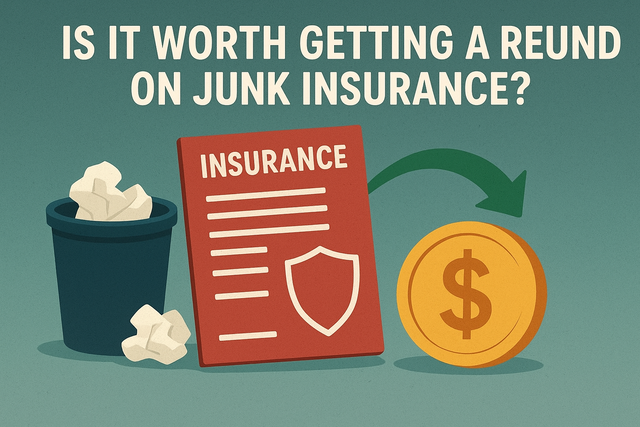
Is It Worth Getting a Refund on Junk Insurance? Key Insights You Need to Know
Junk insurance has come under greater scrutiny in recent years, especially following prominent inquiries that exposed how widely Australians were being sold policies without knowing they were of little or no use. Some of these products are consumer credit insurance, gap insurance, or add-ons to loans and credit cards that are not needed.
For most people, learning that they paid for this coverage presents a significant question: Is it worth claiming a refund? Below are five observations that help describe the potential benefits, potential risks of insurance fraud, and considerations before taking action.
Table of Content
Understanding Junk Insurance Refunds
Junk insurance is a name given to policies that are being sold under unclear or misleading circumstances, where the policyholders ultimately pay premiums for products that they would never be in a position to use. Refunds enable people to recover money that they should never have paid in the first place.
Claim amounts vary greatly depending on the duration the policy was active and the total cost of premiums. While refunds are not always substantial, many have been able to recover thousands of dollars. Beyond the financial relief, pursuing a refund also holds insurers accountable, reinforcing the expectation that companies must do business transparently.
The Role of Professional Assistance
Although it is possible to file a refund claim by yourself, the procedure is complex. Claiming normally entails providing voluminous records, filling out forms, and negotiating with insurers who may postpone or reject requests. Professional services can quicken outcomes and reduce stress.
For instance, I can hire claims experts who will help me get my refund and ensure that documents are prepared properly, while also negotiating directly with the insurance provider. Engaging professionals has the potential of increasing the chances of getting a fair settlement, particularly where the amount involved is large or the policies span years.
The Risks of Insurance Fraud
Whereas legitimate refunds do justice, fraudulent claims create issues. Insurance fraud occurs when individuals intentionally provide misinformation or staged circumstances to obtain funds illegally. Such actions undermine trust in the system and most often result in increased verification for everyone claiming.
The consequences of fraud are severe, including fines, restitution mandates, or even criminal charges. Therefore, honesty and truthfulness need to be followed when applying for refund claims. Telling the truth not only saves you from legal harm but also helps real victims of junk insurance receive justice without further hindrances.
Evaluating Time and Effort Versus Reward
A significant factor in opting to pursue a junk insurance refund is weighing the alleged payout against the effort required. While some claims would reclaim a sizable sum, others would only reclaim a small amount. For those with few policies, administrative inconvenience might overshadow the benefit.
However, when multiple policies or numerous years of premiums stand to be gained, the overall refund can be well worth it. Timing is also of the essence: although financial institutions are more forthcoming now under regulatory pressure, claims resolution could still be behind by several months. Being realistic about assessing your situation makes you set the correct expectations from the start.
The Broader Value of Pursuing Refunds
Apart from personal financial gain, seeking a refund can contribute to broader consumer protection. In protesting against unfair practices, the message goes out that deceptive selling will be punished. Refunds nudge institutions to be more open and not to mislead prospective customers.
Even small refunds are a stand against unethical practices, in support of reforms in the financial industry. On the moral plane, claiming a refund is not only about personal responsibility but collective responsibility as well. By taking what is yours, you are helping create a more balanced and transparent financial system.
In summary, whether claiming a refund on trash insurance is worth it or not depends on personal circumstances, including the scope of potential returns, affinity for paperwork, and personal priorities. Professional help can speed up the process, but remain honest to avoid falling into fraudulent practices.
While not all claims equal life-changing figures, the process of recovering lost funds and fighting against unfair practices is valuable beyond dollars and cents. For most, pursuing a refund is both financial justice and a move towards establishing stronger consumer protections for tomorrow.


